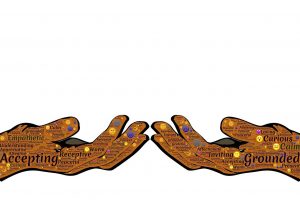Integrative Therapy: A New Paradigm
I just came back from Rishikesh, India, where I studied Yoga (Kundalini) for a whole month. I am an Integrative Transpersonal Psychotherapist, Life Coach and Energy Healer and I was drawn to discover the wisdom of Yog (Yoga) in its original birthplace. The conscious inclusion of mind, body and soul in one practice sounded very interesting to me and I was not disappointed.
My cultural observations and experiences are not relevant to this article, besides the fact that we are talking about a city that is full of yoga schools, students from all over the world and lots of spiritual ceremonies that happen in public all the time like Ganga Aarti which is a thanksgiving ceremony to river Ganga. Devotion, spirituality, god and sacredness are as present in the city as the cows that roam around its streets.
During my training I was amazed to discover that Yog was not just the postures (aasan) that we learn in the West but much more. This is an ancient system of wisdom with its eights limbs (one of them being the postures) that, if followed correctly, they can lead to samadhi, enlightenment, liberation from suffering that the whole humanity seems to be craving for. I was gutted to realise how little of this precious knowledge is being passed on in the yoga classes that being taught in the west. Western mind has been programmed to ‘take and go’, use something and leave it without understanding it, like a spoilt child who wants to eat a fruit with little participation in the process of its cultivation and harvest. Attitude that is very different to what truly Yog is as a spiritual practice that requires applied ethics, commitment and a sense of enjoyment of the path of liberation.
What is an integrative approach?
Coming from a western background myself, I now have a better understanding of where yog (and other spiritual practices of the east) resemble and differ from the western mind and practices. In my practice I always seek integration within (intra) and outside (inter), hence I studied and continue studying different modalities which all work for the same purpose, they constitute methods that people can use to live more free and fulfilling lives. As methods they all have flaws and limitations (mainly due to their application) and none of them, I believe, it is one size fits all and, yet, they all have very useful and sometimes overlapping ingredients and benefits.
From this point of view we are talking about a paradigm shift which contrasts or better goes beyond the traditional forms of therapy that promise exclusively happiness and comfort. The new paradigm that is already occurring in practices, collaborations and literature focuses equally on happiness and sadness as temporary states of being and draws the attention into inner peace, balance and joy that are not dependant on external factors and material possessions, but they are inner states of being.
On the physical level, our bodies, our vehicles to experience life, they need healthy and compatible food and physical activity. If they don’t get it, they get stiff, rigid, tense and sick through everyday way of living, habits and activation of unhealthy genetic predispositions (every body is of different make!).
On the emotional level, our e-motions, the movement of energy that informs us of what we are experiencing, if not expressed authentically, they get stored in our systems creating further distortions and blockages out of fear, anxiety, de-pression etc
On the mental level, if our thoughts are punitive, harsh, disastrous made of past memories that lead to preoccupations, ego patterns, emotional states etc., then our mind is going to be rigid, stuck and stiff, unable to give us peace and provides us with the solutions to problems we have.
What is integrative or holistic therapy?
The soul longs to heal past wounds, to get free from dysfunctional patterns, to purify and manifest in its pristine form and qualities.
I am aware that this might not be big news to some people and, yet, it seems that it has taken lots of time for professionals and vocational communities to accept, beyond their ego-identity, that other methods are aiming towards the same goal and instead of treating them as enemies, they can respond to them as ‘cousins’. It is like dealing with various members of a family that they are all unique and special who live in the same house to which they all contribute. In fact, one could say that because of the vast diversity of people, each person can develop one therapeutic method that works for themselves.
People who are using and people who are offering health, complimentary and self development services of any discipline can not anymore deny- hence they have to work on that basis- that we are complex systems with physical, emotional, mental and spiritual dimensions and that illness of any kind is a manifestation of an imbalance in one or many of those levels and, if effective, they need to be addressed as such.
Integrative therapy
A logical consequence from the above is that we need a new model, an integrative approach, that will incorporate the totality of our existence, an integrative therapy. It is proven actually hard to give a complete definition of integrative therapy.
It could take many forms and/or a combination of them such as traditional medicine with Chinese medicine, integrative psychotherapy and yoga or dance therapy and coaching or energy healing and contact improvisation or reiki and Ayurveda, and so on. As long as body, mind and soul are being listened to, nurtured, healed and freed consistently from patterns that keep them locked and limited, then that is integrative therapy, that is what living in health, light, peace, joy and freedom might feel like.
Have you experienced it?
Panos Goumalatsos



